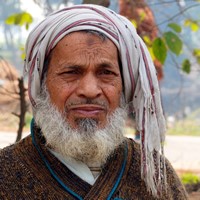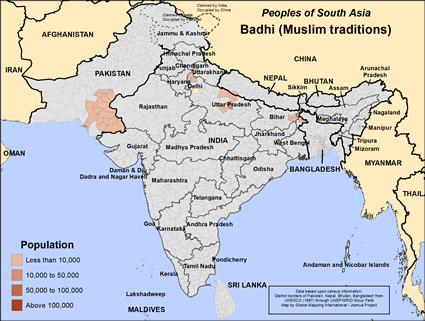Shershabdia (Muslim traditions) in Pakistan

Photo Source:
Copyrighted © 2026
Isudas All rights reserved. Used with permission |

Map Source:
People Group data: Omid. Map geography: UNESCO / GMI. Map Design: Joshua Project
|
| People Name: | Shershabdia (Muslim traditions) |
| Country: | Pakistan |
| 10/40 Window: | Yes |
| Population: | 2,900 |
| World Population: | 37,900 |
| Primary Language: | Sindhi |
| Primary Religion: | Islam |
| Christian Adherents: | 2.00 % |
| Evangelicals: | 2.00 % |
| Scripture: | Complete Bible |
| Ministry Resources: | Yes |
| Jesus Film: | Yes |
| Audio Recordings: | Yes |
| People Cluster: | South Asia Muslim - other |
| Affinity Bloc: | South Asian Peoples |
| Progress Level: |
|
Introduction / History
The Muslim Shershabdia people, with roots tracing back to the Arab traders and warriors who settled in the Indian subcontinent centuries ago, have a rich and storied history. They embraced Islam and migrated to present-day Pakistan, integrating into the local culture while preserving their distinct identity. Over the years, they have established themselves as respected members of society, contributing to various fields including trade, agriculture and scholarship.
What Are Their Lives Like?
Today, the Muslim Shershabdia people primarily reside in urban and rural areas of Pakistan. They engage in a variety of occupations such as farming, trading and public service. Many Shershabdia families own and cultivate land, growing crops like wheat, rice and sugarcane. In urban areas, they pursue careers in business, education and government. The Shershabdia community maintains strong family ties and a deep sense of cultural identity. The Shershabdia community also places great importance on education, striving to pass on both religious and secular knowledge to the younger generations. They actively participate in social and religious events, reinforcing their community bonds and traditions.
What Are Their Beliefs?
The Muslim Shershabdia people practice Sunni Islam, integrating their faith into every aspect of their lives. They observe Islamic rituals, including daily prayers, fasting during Ramadan, and celebrating religious festivals such as Eid. Their belief system emphasizes values like honor, hospitality, and community service, reflecting their Islamic teachings and heritage.
What Are Their Needs?
The Muslim Shershabdia people face several pressing needs that require attention to improve their quality of life. Access to quality education remains essential, as it provides opportunities for the younger generation to advance and succeed. Improved healthcare services are crucial, given the limited availability of medical facilities in some areas. Economic support through agricultural innovation, market access and vocational training can boost their livelihoods. Infrastructure development, including better roads, clean water supply and electricity, will also benefit the Shershabdia community. Addressing these needs will enable the Shershabdia people to achieve greater socio-economic stability.
Prayer Points
Pray for deliverance from the fear that hinders God's blessing from multiplying through the families and communities in the Shershabdia community.
Pray for their elders and family leaders to have dreams of the soon coming Messiah.
Pray for Shershabdia disciples to make more disciples.
Pray for loving and dedicated workers.